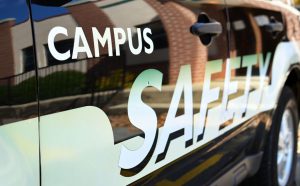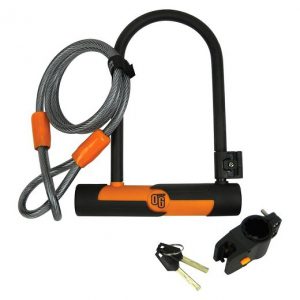
Parents worry about campus safety more than their students do. It is important to know that colleges and universities are required to develop and implement safety plans to prevent and respond to emergency situations. Most schools have a campus police force or security staff dedicated to protecting students. These officers are trained to talk to students about how to be safe. Schools also work with community police to ensure that areas around campus are patrolled.
Colleges and universities are increasingly training students in Bystander Intervention practices. These trainings help students identify situations that have the potential for becoming dangerous and teach steps for safely and effectively de-escalating problems.
There are steps parents can take to learn about the safety and security at the college or university your student will attend. A national database is available online. You can identify the name and location of colleges and universities to see crime data for the most recent three years.
Information about the school’s safety plan will be available at the college or university website of the school your student will attend. Go to the campus homepage and do a search for “safety” or “campus safety.” There will probably be multiple results from your search, and among them will be listings such as Annual Safety Report, Crime Alerts, or Safety Guide. Look for the services schools provide, such as late-night escort services to accompany students as they walk across campus, educational programs or trainings to remind students about safety tips, and advice on how to help others in an emergency.
Colleges and universities in the U.S. are required to report any campus crimes that have occurred each year. Nearly every school will have at least some crimes listed–wherever there are dense populations, there is likely to be some level of criminal activity. You’re likely to find that the most common crimes are thefts of laptops, cell phones, and bicycles–items that are easily taken when students are not paying attention and step away from their belongings for a few minutes.
Off-Campus Concerns
College students do not spend all their time on campus; community safety is also important. You can see crime data for cities throughout the United States on this website, click here.
Any time there is a major incident in America that makes national or international news, parents will worry: “Does this affect my student?” If something happens in the city where your student is attending college, it may be miles away from campus. Hearing of a wildfire near San Diego, California may cause parents to fear for their children in Los Angeles or San Francisco. Although the cities look close together on a map of the U.S., they are many miles apart. In fact, you may know more about the incident than your student who is not listening to news updates.
While family members typically may be in touch with their student by phone or Internet on a daily or regular basis, emergency situations may mean you can’t contact your child right away. You may hear there is a major storm in the area where your student is living, but you don’t know how it affects life on campus. During those times, colleges and universities affected by an incident will post a notice on their website as soon as possible.
Identify an online news source from the area before a crisis happens and check the news website for updates if an emergency occurs. In some cases, it will help to have a third party identified that your student might be able to contact more easily than calling home–a friend or relative who lives near campus or somewhere else in the U.S. might be able to reach your student more quickly than you can.
Safety Tips to Discuss with Students
Emergency Assistance in the U.S.

If students are seriously injured, ill, or feel that they’re in danger, they should call for emergency assistance by dialing 911 on a cell phone or landline phone. The 911 service is available anywhere in the U.S. and should be used for immediate assistance from police, the fire department or ambulance. Examples include:
- Fire
- Crime, especially if in progress
- Car crash, especially if someone is injured
- Medical emergency, especially symptoms that require immediate medical attention
If your student is unsure whether a situation is a true emergency, the person answering the call will talk with your student about what is happening and help determine whether to send help. When in doubt, it’s best to call 911. For any call to 911, there will be a series of questions that help identify what kind of assistance is needed, where the caller is, and what equipment might be needed for the situation.
More information about 911 is available online, click here.
Safety Advice to Students
Walking Across Campus at Night

- At night, students should walk with a friend if possible. If they have no one to walk with, use the college or university escort service.
- Avoid shortcuts. They should use well-traveled and well-lit walkways.
- Be alert and aware of the people and environment around you. Students should not talk on the phone or use earphones while walking alone, and they should not display personal belongings of value.
- Trust instincts. If someone or something makes them uncomfortable, even in daylight, they should do what is necessary to move away from them.
- If they feel that someone is following them, they should go immediately to a nearby location where there are more people.
- Know the location of any special emergency phones on campus. These are often identified by blue lights.
In a Residence Hall or Apartment

- Students should always lock their doors. Even if they’re just going down the hall for a few minutes; even if they trust the people who live near them–they should lock the door when they are not in the room and lock the door at night when they’re sleeping.
- It is important to check to see who is at the door before opening it.
- A common problem in residence halls and in buildings with security doors is that students let people they don’t know follow them into the building through a secure entrance. Students call this “tailgating,” and it is an easy way for people without approved access to get into a building. Students should avoid letting anyone they don’t know follow them into a secure space.
- When students need help in the dormitory, they can go to the front desk, the resident assistant (an upperclassmen who has received training to assist other students) they have been assigned to, or campus police or security monitors.
Sexual Assault and Violence
- When preparing for a date or a party, students (female and male) should be sure they have their cell phone with them and charged. They should have a ride service app on their phone, a cab company identified in their phone’s directory, and enough cash to pay for a cab ride home if needed.
- At parties and bars, they should keep friends in sight, watch out for each other, and check in from time to time to make sure everyone is comfortable with how things are going.
- If students find themselves in a situation where something feels wrong, they should trust their instincts and look for a way out of the situation—move closer to other people or seek out a safe way to get home. They should not ignore sudden feelings of mistrust just because they have known someone for a long time. You can’t tell if a person has the potential for violence based on past behaviors.
- Students should never leave a drink unattended or accept a drink that they did not see poured.
- If they’re going to drink, they should stop when they begin to feel the effects of alcohol. The more you drink, the harder it is to know when to stop.
- If a student is sexually assaulted, they should go to a clinic or emergency room immediately. They can decide later whether or not to press charges, but it is critical that they receive medical attention and caring support as soon as possible.
Bike Safety
- Helmets and lights are basic protective equipment. Although they are not required in any state for riders over 18, they are recommended. With all the investment families are putting into their students’ education, it makes sense to protect those brains.

- Students who have a bicycle on campus should use a U-lock, a particularly strong type of padlock, to lock the bike.
- Students should be sure to lock the front wheel to a solid and sturdy object or rack that the bike cannot be lifted over; lock according to value–bike frame is most important, then back wheel, then front wheel.
- The seat should be removed and carried, along with the helmet, to keep it safe.
- Helmets and lights are basic protective equipment. Although they are not required in any state for riders over 18, they are recommended. With all the investment families are putting into their students’ education, it makes sense to protect those brains.
Social Networking

Students are urged not to post personal information on online social networking sites (i.e., Facebook, Twitter, Instagram, etc.). Although it’s tempting for first-year students to post a photo of their student ID or class schedule, these documents include data that should not be shared. They should be careful about what they share on social media and they should not share their address or cell phone number with people they don’t know well. Before posting anything, they should always consider whether they would want their parents, grandparents, instructors, or a future employer to see their message or photo.
Record Keeping
It’s important for students to have a record of the serial numbers of valuable items, including computers and laptops, printers, bicycles, TVs, cell phones, electronic tablets, digital cameras, and other electronics. Students can download location-finding apps for tracing electronics that are lost or stolen.

